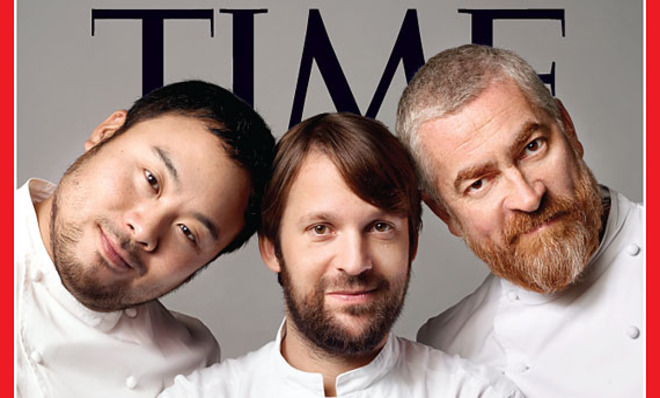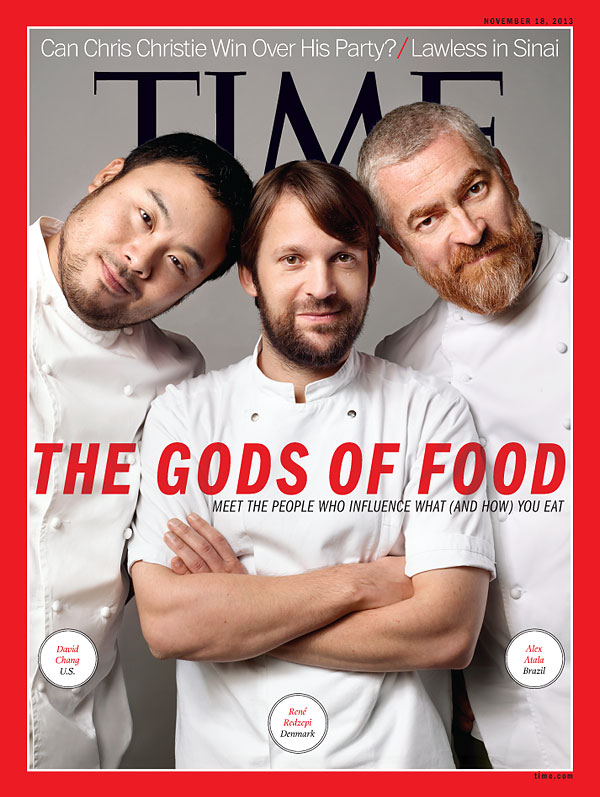Why sexism persists in the culinary world
TIME's "Gods of Food" cover is just the most recent example of female chefs being ignored


Though the most recent winner of Top Chef was a woman and one of the most famous cooks in American history, Julia Child, has been a household name for six decades, the culinary world remains deeply sexist.
If you want proof, look no further than TIME’s special issue on the “Gods of Food.” On the cover are three men, no women. Of the 13 “gods of food” in the issue, four are women, but none of them are chefs. In the spread of 50 influential chefs interconnected in a family tree, not a single one was a woman.
This is extra baffling considering that nearly half the students at the Culinary Institute of America are women, up from less than a third in 2000, and more than 20 percent of chefs or head cooks in the U.S. are women. Even Belinda Luscombe at TIME admits, “As a mirror of the world, TIME’s list was flawed.”
The Week
Escape your echo chamber. Get the facts behind the news, plus analysis from multiple perspectives.

Sign up for The Week's Free Newsletters
From our morning news briefing to a weekly Good News Newsletter, get the best of The Week delivered directly to your inbox.
From our morning news briefing to a weekly Good News Newsletter, get the best of The Week delivered directly to your inbox.
But TIME’s cover isn’t an isolated incident. Female chefs have been overlooked for some time. Even when food writers hailed Alain Ducasse as the first chef to earn six Michelin stars in 1998, they forgot the fact that a woman, Eugenie Brazier, actually accomplished that feat more than 60 years earlier.
For one, women in the culinary world face the same challenges that women in all professions face: Balancing work and family. Rebecca Charles, who opened New York’s Pearl Oyster Bar, told New York in 2007, “You have to give up a lot. That’s what’s hard for a lot of young women to understand. There very few women who can have children and continue to operate restaurants, whether they’re owners or chefs.”
Still, others think there are facets specific to the restaurant industry and culinary world that hurt the standing of female chefs. Amanda Cohen, the chef of New York’s Dirt Candy, argues that the media is partly to blame. “The reality of the situation is that there are lots of women in professional kitchens, and there always have been, but for some reason the press choose not to cover them,” she writes at the New York Times.
For this reason, she explains, “If I were an investor choosing between a male and a female chef, both of whom were equally talented, it would make more sense to go with the man every time, because he’d get more press, which will earn more awards, which will attract more customers.”
A free daily email with the biggest news stories of the day – and the best features from TheWeek.com
Others argue that machismo — or even misogyny — is prevalent in the kitchen, especially on the hot line. British chef Margot Henderson explained that even at her own restaurants, women are often delegated by men to tasks considered lower in rank or less prestigious. “Male chefs prefer to have women preparing vegetables and pastries," she tells Vice. "She has to really push through if she wants to be dealing with things like fish and meat.”
“Given a choice of promoting a man or a woman, male chefs generally pick a man — he will feel humiliated if passed over for women,” writes Alan Richman at the New York Times.
Even worse, many women are ostracized and even harassed in the kitchen. “Female cooks have always been treated appallingly,” says Richman. “Include sexual harassment — more verbal than physical — in the list of transgressions.”
But some female chefs believe that women and men focus on different aspects of cooking — that women go for more straightforward and comforting food and men focus more on trendy and high-tech cuisine (think Ferran Adria’s molecular gastronomy versus April Bloomfield's heartier fare). And ultimately, TIME and other media outlets place a higher value on the flashier aspects of the culinary world.
James Beard-winning Alice Waters tells TIME, “If we celebrated food for what it should be celebrated for, women would just naturally rise to the top.”
Emily Shire is chief researcher for The Week magazine. She has written about pop culture, religion, and women and gender issues at publications including Slate, The Forward, and Jewcy.
-
 Taiwan eyes Iron Dome-like defence against China
Taiwan eyes Iron Dome-like defence against ChinaUnder the Radar President announces historic increase in defence spending as Chinese aggression towards autonomous island escalates
-
 Political cartoons for November 30
Political cartoons for November 30Cartoons Sunday's political cartoons include the Saudi-China relationship, MAGA spelled wrong, and more
-
 Rothermere’s Telegraph takeover: ‘a right-leaning media powerhouse’
Rothermere’s Telegraph takeover: ‘a right-leaning media powerhouse’Talking Point Deal gives Daily Mail and General Trust more than 50% of circulation in the UK newspaper market